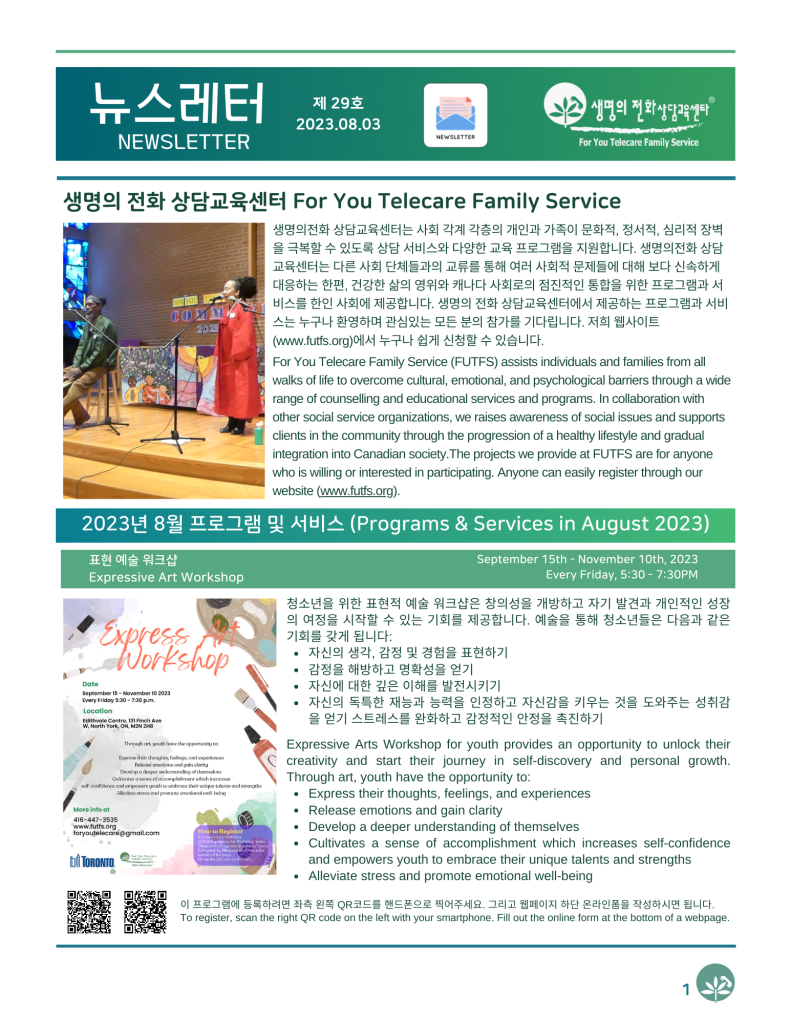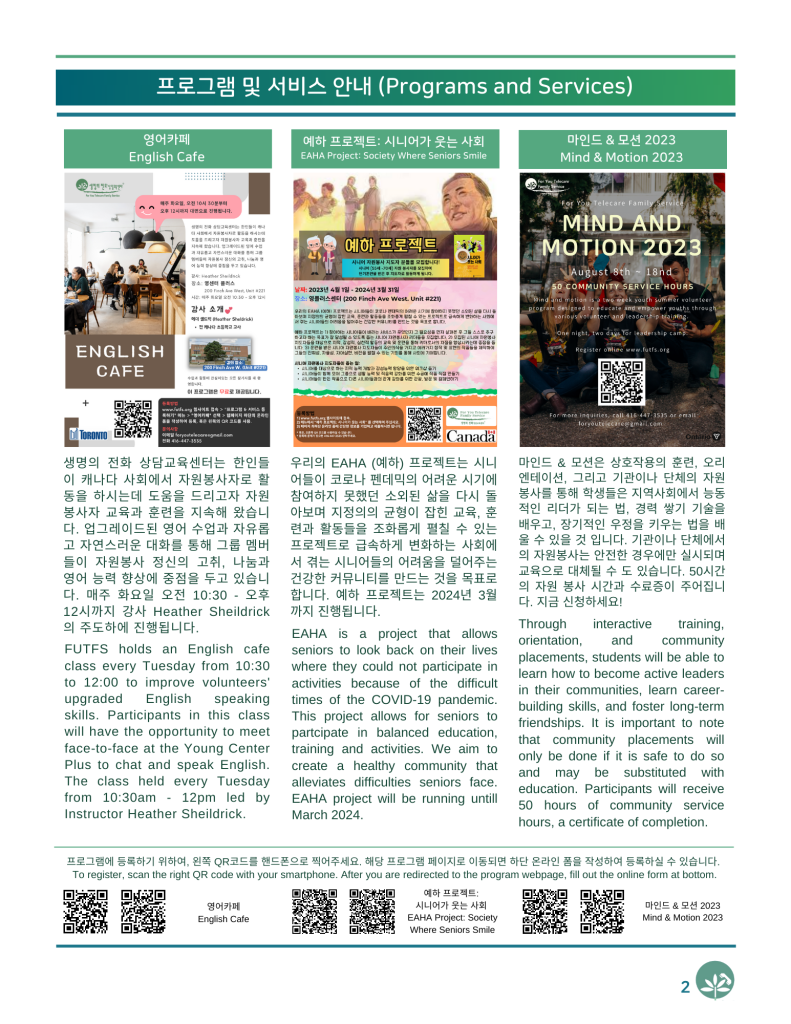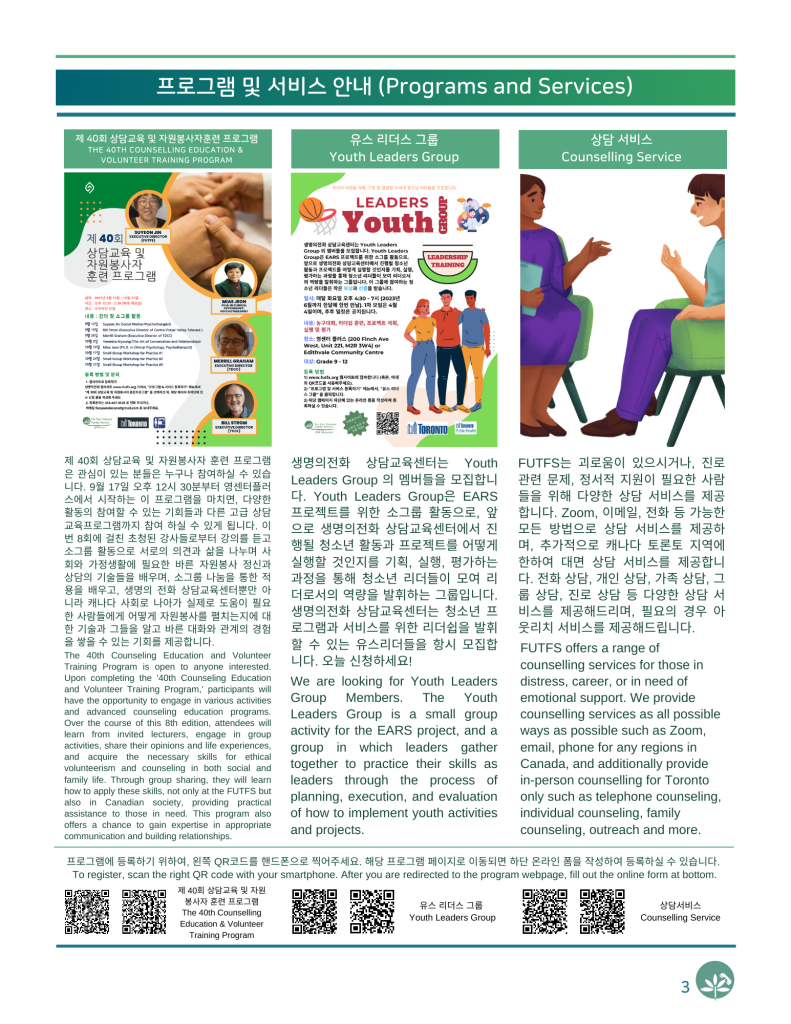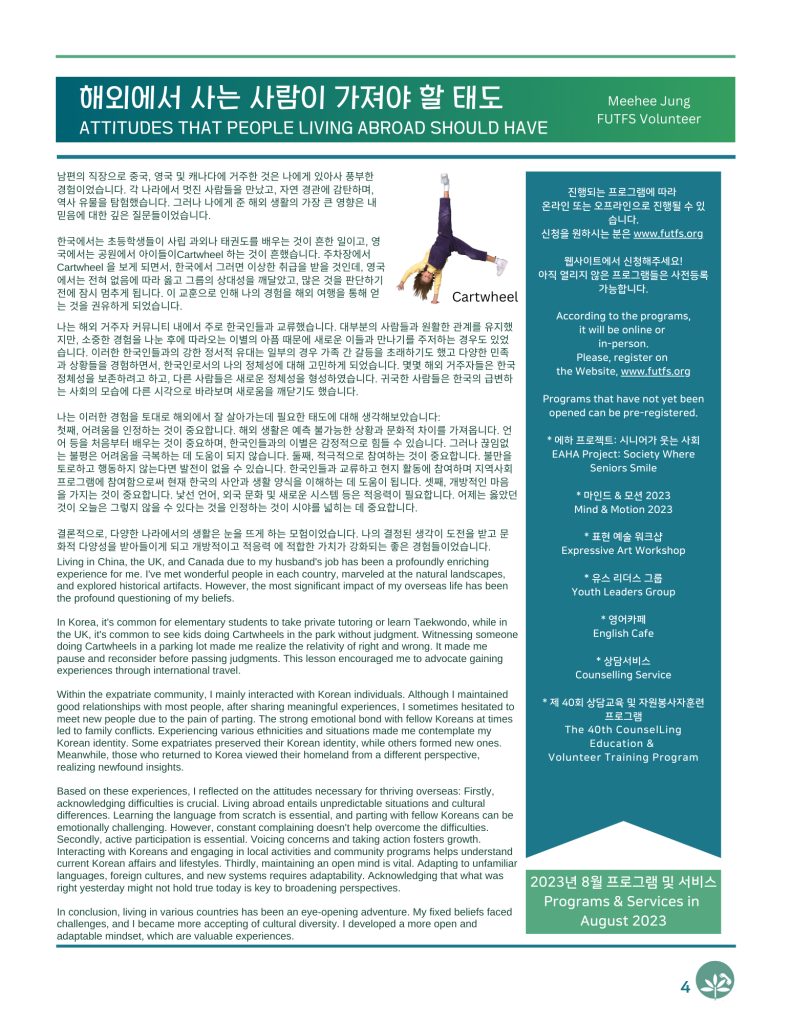FUTFS Newsletter 29 (August 2023)

For You Telecare Family Service (FUTFS) assists individuals and families from all walks of life to overcome cultural, emotional, and psychological barriers through a wide range of counselling and educational services and programs. In collaboration with other social service organizations, we raises awareness of social issues and supports clients in the community through the progression of a healthy lifestyle and gradual integration into Canadian society.The projects we provide at FUTFS are for anyone who is willing or interested in participating. Anyone can easily register through our website (www.futfs.org).
Programs & Services in August 2023
1. Expressive Art Workshop
Expressive Arts Workshop for youth provides an opportunity to unlock their creativity and start their journey in self-discovery and personal growth. Through art, youth have the opportunity to:
- Express their thoughts, feelings, and experiences
- Release emotions and gain clarity
- Develop a deeper understanding of themselves
- Cultivates a sense of accomplishment which increases self-confidence and empowers youth to embrace their unique talents and strengths
- Alleviate stress and promote emotional well-being

2. English Cafe
FUTFS holds an English cafe class every Tuesday from 10:30 to 12:00 to improve volunteers' upgraded English speaking skills. Participants in this class will have the opportunity to meet face-to-face at the Young Center Plus to chat and speak English. The class held every Tuesday from 10:30am - 12pm led by Instructor Heather Sheildrick.
3. EAHA Project: Society Where Seniors Smile
EAHA is a project that allows seniors to look back on their lives where they could not participate in activities because of the difficult times of the COVID-19 pandemic. This project allows for seniors to partcipate in balanced education, training and activities. We aim to create a healthy community that alleviates difficulties seniors face. EAHA project will be running untill March 2024.
4. Mind & Motion 2023
Through interactive training, orientation, and community placements, students will be able to learn how to become active leaders in their communities, learn career-building skills, and foster long-term friendships. It is important to note that community placements will only be done if it is safe to do so and may be substituted with education. Participants will receive 50 hours of community service hours, a certificate of completion.

5. The 40th CounselLing Education & Volunteer Training Program
The 40th Counseling Education and Volunteer Training Program is open to anyone interested. Upon completing the '40th Counseling Education and Volunteer Training Program,' participants will have the opportunity to engage in various activities and advanced counseling education programs. Over the course of this 8th edition, attendees will learn from invited lecturers, engage in group activities, share their opinions and life experiences, and acquire the necessary skills for ethical volunteerism and counseling in both social and family life. Through group sharing, they will learn how to apply these skills, not only at the FUTFS but also in Canadian society, providing practical assistance to those in need. This program also offers a chance to gain expertise in appropriate communication and building relationships.
6. Youth Leaders Group
We are looking for Youth Leaders Group Members. The Youth Leaders Group is a small group activity for the EARS project, and a group in which leaders gather together to practice their skills as leaders through the process of planning, execution, and evaluation of how to implement youth activities and projects.
7. Counselling Service
FUTFS offers a range of counselling services for those in distress, career, or in need of emotional support. We provide counselling services as all possible ways as possible such as Zoom, email, phone for any regions in Canada, and additionally provide in-person counselling for Toronto only such as telephone counseling, individual counseling, family counseling, outreach and more.

Attitudes That People Living Abroad Should Have
Living in China, the UK, and Canada due to my husband's job has been a profoundly enriching experience for me. I've met wonderful people in each country, marveled at the natural landscapes, and explored historical artifacts. However, the most significant impact of my overseas life has been the profound questioning of my beliefs.
In Korea, it's common for elementary students to take private tutoring or learn Taekwondo, while in the UK, it's common to see kids doing Cartwheels in the park without judgment. Witnessing someone doing Cartwheels in a parking lot made me realize the relativity of right and wrong. It made me pause and reconsider before passing judgments. This lesson encouraged me to advocate gaining experiences through international travel.
Within the expatriate community, I mainly interacted with Korean individuals. Although I maintained good relationships with most people, after sharing meaningful experiences, I sometimes hesitated to meet new people due to the pain of parting. The strong emotional bond with fellow Koreans at times led to family conflicts. Experiencing various ethnicities and situations made me contemplate my Korean identity. Some expatriates preserved their Korean identity, while others formed new ones. Meanwhile, those who returned to Korea viewed their homeland from a different perspective, realizing newfound insights.
Based on these experiences, I reflected on the attitudes necessary for thriving overseas: Firstly, acknowledging difficulties is crucial. Living abroad entails unpredictable situations and cultural differences. Learning the language from scratch is essential, and parting with fellow Koreans can be emotionally challenging. However, constant complaining doesn't help overcome the difficulties.
Secondly, active participation is essential. Voicing concerns and taking action fosters growth. Interacting with Koreans and engaging in local activities and community programs helps understand current Korean affairs and lifestyles. Thirdly, maintaining an open mind is vital. Adapting to unfamiliar languages, foreign cultures, and new systems requires adaptability. Acknowledging that what was right yesterday might not hold true today is key to broadening perspectives.
In conclusion, living in various countries has been an eye-opening adventure. My fixed beliefs faced challenges, and I became more accepting of cultural diversity. I developed a more open and adaptable mindset, which are valuable experiences.
Meehee Jung (FUTFS Volunteer)
